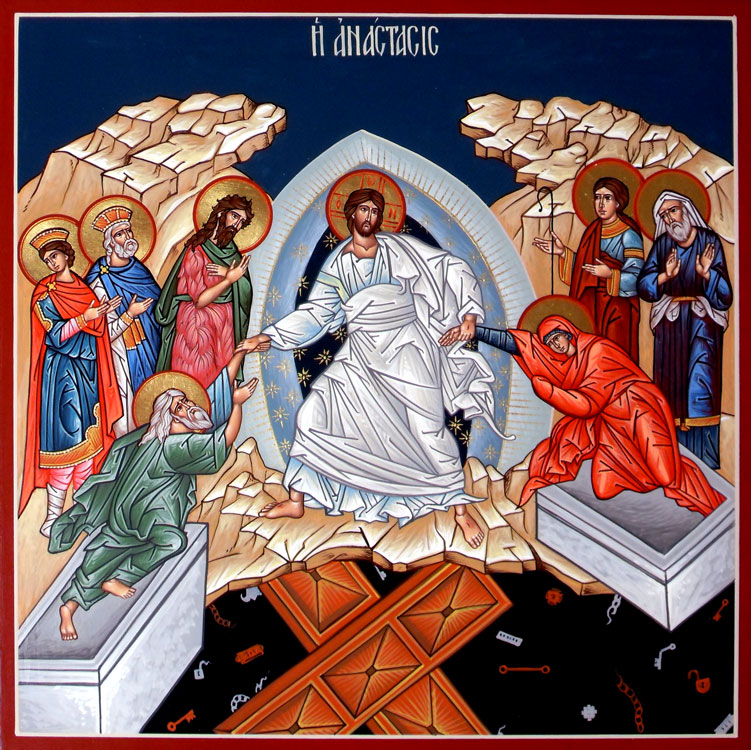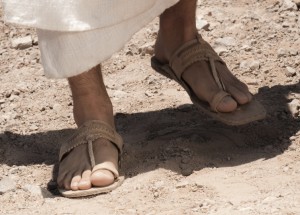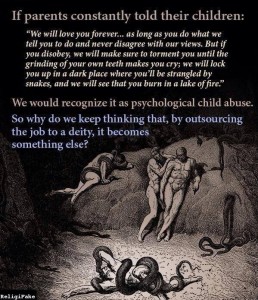====================
This sermon was preached on Easter Sunday, April 20, 2014, at St. Paul’s Episcopal Church, Medina, Ohio, where Fr. Funston is rector.
(The lessons for the day were: Jeremiah 31:1-6; Psalm 118:1-2,14-24; Colossians 3:1-4; and John 20:1-18. These lessons can be read at The Lectionary Page.)
====================
 Several days ago, as I was reading again the Easter story and the sections of the Holy Scriptures appointed for this year, I had the radio on and tuned to my favorite oldies station.
Several days ago, as I was reading again the Easter story and the sections of the Holy Scriptures appointed for this year, I had the radio on and tuned to my favorite oldies station.
I was prayerfully considering and trying to figure out what Paul was saying to the Colossians when he wrote these words that we heard in the Epistle lesson for today: “You have died, and your life is hidden with Christ in God.” (Col. 3:3) I was trying to figure out what Paul meant by “hidden with Christ.” The Greek word is krypto and in addition to “hidden” it can also mean “secret” or “not noticed.” It is the origin of words like cryptogram and cryptography and also of crypt, a synonym for tomb. What does Paul mean? Is he saying our life is buried with Christ? Or that, somehow, the Christian life is a “secret” or that it goes “unnoticed”?
So I was pondering all of that and my oldies station played a very old and familiar song:
It hurts to be in love when the only one you love
Turns out to be someone who’s not in love with you
It hurts to love her so when deep down inside you know
She will never want you, no matter what you doAnd so you cry a little bit
Oh, you die a little bit
Day and night, night and day
It hurts to be in love this way
Some of you are old enough to recognize the lyrics of It Hurts To Be In Love by Gene Pitney, a Top Ten hit from 1964.
And then, right after that song, the radio station played the one which has this as the refrain:
Strumming my pain with his fingers
Singing my life with his words
Killing me softly with his song
Killing me softly with his song
Telling my whole life with his words
Killing me softly with his song
That was a Number One hit for Roberta Flack in 1973.
Those songs played just as I was prayerfully considering and trying to figure out what Paul was saying to the Colossians when he wrote: “You have died, and your life is hidden with Christ in God.” (Col. 3:3) Now I don’t really think that God speaks to me through the radio or in the lyrics of popular songs, although it’s possible that God does. However, that coincidence of lyrics and Biblical text did take me down a path of revelation that I’d like to share with you this morning.
Those songs and songs like them – you can probably name several popular melodies going back to Cole Porter’s 1944 tune Every Time We Say Goodbye (“Every time we say goodbye, I die little”) or before – songs that mention this sense we have all had of “dying a little” because of a broken heart, because of the loss of a loved one, because of a disappointment in life. I think that’s why these songs become popular. We’ve all had that sense of “dying a little inside” for these and for many other reasons. And so Paul writes to the Colossians and to us:
“You have died, and your life is hidden with Christ in God.”
In his historical play Julius Caesar, William Shakespeare has his title character observe that “a coward dies a thousand times before his death, but the valiant taste of death but once.” (Act 2, Sc. 2) Ernest Hemingway took Shakespeare to task about that. In A Farewell to Arms he wrote:
‘The coward dies a thousand deaths, the brave but one’…. (The man who first said that) was probably a coward…. He knew a great deal about cowards but nothing about the brave. The brave dies perhaps two thousand deaths if he’s intelligent. He simply doesn’t mention them.
I think the truth is that everybody, valiant or cowardly, everybody dies many little deaths throughout our existence on this earth. Each and every one of us is “killed softly” in myriad ways by the circumstances of life. We have, as Paul wrote to the Colossians, died . . . many times over.
Sometimes those little deaths are the result of our own actions; sometimes they are the result of other’s actions; sometimes they happen because that’s just the way the world is. The world, though created by God to be good, is out of kilter; it is, we say theologically, fallen. The world and everything in it, including you and me, are not in the proper relationship with our Creator. We are not in proper relationship with one another. We call that “sin.” And sin, as the writer of the Letter to the Hebrews reminds us, has weight, a weight that clings to us like dirt, and each time we experience one of those little deaths a little more weight, a little more dirt is tossed on until, as Paul wrote in this simple verse in the letter to the Colossians, we are buried.
“You have died, and your life is hidden with Christ in God.”
Think about the weight of all that sin, all that dying, experienced in little ways every day by all the people who have ever lived . . . think of that weight crashing down
through the centuries,
through the millennia,
through all of time and all of space,
crashing down to a single hour,
a single moment,
a single instant,
on a hill outside of Jerusalem,
on a single man,
a man hanging on a cross
who cried out
“It is finished!”
“You have died, and your life is hidden with Christ in God.”
They took him down from the cross and laid him in a tomb and on the day after the Sabbath the women came and found the tomb empty. We know that story so well. It is the foundational story of our faith. We know it so well and yet we have to be reminded of it again and again because those little deaths seem to keep happening and hiding it from us. “Our life is hidden;” it gets buried under that weight; it goes unnoticed.
 In the Eastern Orthodox tradition, icons of the Resurrection depict Christ rising from the tomb with a whole crowd of people. To one side of him crowned and haloed are King David and King Solomon; on the other, we see Abel the first martyr of creation carrying a shepherd’s crook and Moses the first prophet of the Old Covenant. Also present is John the Baptist, who is both the first prophet and the first martyr of the New Covenant. Beneath Christ’s feet, the gates of hell lie broken, often forming a cross. And from two tombs, Adam and Eve are rising, but not of their own accord; Jesus holds them by the wrists and is pulling them from their graves.
In the Eastern Orthodox tradition, icons of the Resurrection depict Christ rising from the tomb with a whole crowd of people. To one side of him crowned and haloed are King David and King Solomon; on the other, we see Abel the first martyr of creation carrying a shepherd’s crook and Moses the first prophet of the Old Covenant. Also present is John the Baptist, who is both the first prophet and the first martyr of the New Covenant. Beneath Christ’s feet, the gates of hell lie broken, often forming a cross. And from two tombs, Adam and Eve are rising, but not of their own accord; Jesus holds them by the wrists and is pulling them from their graves.
The mythological proto-parents of our race, the ancient kings, the prophets and martyrs . . . this little crowd represents all of humankind . . . you and me and all the people who have ever lived, all the people who have ever died any kind of death, whether physical death or the little daily kinds of dying we all have experienced . . .
we are all there,
all being pulled from death,
pulled from out of hiding,
pulled from where we are buried,
pulled from where the life God wants for us is unnoticed,
all rising with Christ to new life.
“In a moment, in the twinkling of an eye, . . . ‘Death has been swallowed up in victory.’ ‘Where, O death, is your victory? Where, O death, is your sting?’” (1 Cor. 52,54-55) “You have died, and your life is hidden with Christ in God.”
We celebrate Easter, the historical fact of the Resurrection of Christ, not because it is something that happened 2,000 or so years ago, although it is certainly that. We celebrate the Resurrection because it is something that happens every day. “You have died . . .” Every day in myriad little ways, as those popular songs and our own experience reminds us, we die a little. Every day our life is obscured and hidden; every day our life is made secret even from us and the life God wants for us goes unnoticed.
But . . .
“It is finished!”
That seemingly endless round of sinful little deaths is over;
it crashed down through time and space
to that one instant
on that one cross
and it was done with,
conquered!
“It is finished!”
Every day Jesus, rising from the tomb, grabs us by the wrist and pulls us from the grave. “I came,” said Jesus, “that they may have life, and have it abundantly.” (John 10:10) Every day, he pulls us up out of the little deaths of sin into the resurrection of that abundant life. “Death has been swallowed up in victory.” “It is finished!”
“When Christ who is your life is revealed, then you also will be revealed with him in glory,” wrote Paul. (Col. 3:4)
Christ has been revealed; we are revealed with him in glory.
Christ is risen.
We are risen!
Death is conquered!
“It is finished!”
We are free!
Alleluia!
====================
A request to my readers: I’m trying to build the readership of this blog and I’d very much appreciate your help in doing so. If you find something here that is of value, please share it with others. If you are on Facebook, “like” the posts on your page so others can see them. If you are following me on Twitter, please “retweet” the notices of these meditations. If you have a blog of your own, please include mine in your links (a favor I will gladly reciprocate). Many thanks!
====================
Father Funston is the rector of St. Paul’s Episcopal Church, Medina, Ohio.
 This may be the most puzzling and disconcerting story in the Gospels. I was taught that Jews had a tradition of denigrating Gentiles as “dogs” — a reference to many negative characteristics of dogs as scavengers, publically shameless, and so on, and to their ritual uncleanness in Jewish law — and that Jesus is just being a typical First Century Palestinian Jew in referring to this obnoxious foreign woman in this way. But . . . the last time I had to preach on this text I did some additional research and found a well-documented paper by a Roman Catholic scholar who had found absolutely no historical literature to substantiate that exegetical tradition. None! In fact, it appears that the first instance in the literary record of a Jew insulting a Gentile by calling him or her a “dog” is . . . this one. Jesus. Insulting this woman.
This may be the most puzzling and disconcerting story in the Gospels. I was taught that Jews had a tradition of denigrating Gentiles as “dogs” — a reference to many negative characteristics of dogs as scavengers, publically shameless, and so on, and to their ritual uncleanness in Jewish law — and that Jesus is just being a typical First Century Palestinian Jew in referring to this obnoxious foreign woman in this way. But . . . the last time I had to preach on this text I did some additional research and found a well-documented paper by a Roman Catholic scholar who had found absolutely no historical literature to substantiate that exegetical tradition. None! In fact, it appears that the first instance in the literary record of a Jew insulting a Gentile by calling him or her a “dog” is . . . this one. Jesus. Insulting this woman. It may be pedestrian of me, but I can’t stop thinking of the messenger’s feet and whether this passage of Isaiah is really very well chosen as the Old Testament lesson for Morning Prayer on the Feast of the Annunciation! Reading the rest of the lesson with its message of redemption and salvation, one can see why it is set out in the special set of Daily Office readings for this feast day, but I can’t get my mind off the feet.
It may be pedestrian of me, but I can’t stop thinking of the messenger’s feet and whether this passage of Isaiah is really very well chosen as the Old Testament lesson for Morning Prayer on the Feast of the Annunciation! Reading the rest of the lesson with its message of redemption and salvation, one can see why it is set out in the special set of Daily Office readings for this feast day, but I can’t get my mind off the feet. In the Education for Ministry (“EfM”)
In the Education for Ministry (“EfM”) Seldom has depression been so artfully described as in these few lines of Hebrew poetry. Translated in the Prayer Book as “embittered,” the Hebrew is chamets which refers to yeast. It means “to be leavened” or “to be sour.” Most versions of the Scriptures translate it with some version of “bitterness,” a few use “grieved,” and the Complete Jewish Bible renders the verse, “when I had a sour attitude.” I rather like that last one, closest to the Hebrew, best; it describes depression perfectly.
Seldom has depression been so artfully described as in these few lines of Hebrew poetry. Translated in the Prayer Book as “embittered,” the Hebrew is chamets which refers to yeast. It means “to be leavened” or “to be sour.” Most versions of the Scriptures translate it with some version of “bitterness,” a few use “grieved,” and the Complete Jewish Bible renders the verse, “when I had a sour attitude.” I rather like that last one, closest to the Hebrew, best; it describes depression perfectly.

 The writer of the Letter to the Hebrews is speaking of folks (the “ground”) who have received the Gospel of Jesus Christ (the “rain”) and have either produced some sort of fruit of good works (a “useful crop”) or have fallen away from the church (producing “thorns”). Of the latter, he says they are “impossible to restore” because “they are crucifying again the Son of God.”
The writer of the Letter to the Hebrews is speaking of folks (the “ground”) who have received the Gospel of Jesus Christ (the “rain”) and have either produced some sort of fruit of good works (a “useful crop”) or have fallen away from the church (producing “thorns”). Of the latter, he says they are “impossible to restore” because “they are crucifying again the Son of God.”  Making the rounds of Facebook these days is an anti-religious meme which basically equates religious teaching to child abuse. It says:
Making the rounds of Facebook these days is an anti-religious meme which basically equates religious teaching to child abuse. It says:

